|
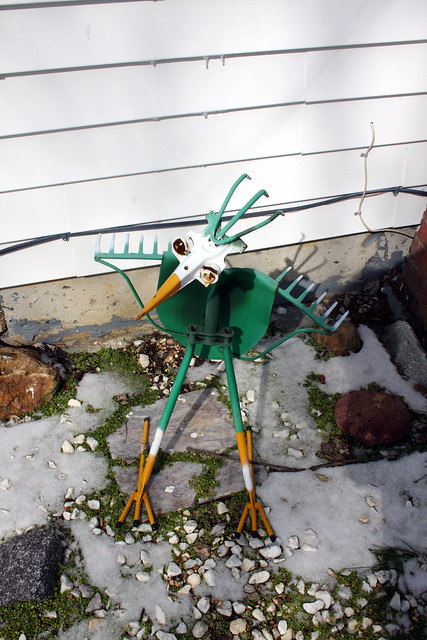
Garden art made from refurbished hand tools.
(*photo credit)
July 1, 2014 What's to Stash and What's to Trash
This is Independence from Stuff Week; we ought to think about removing and recycling all the accumulation of materials that are a burden on us now and on those who must clean up after we depart. We are reluctant to let go because we have the grand idea that someone, someday, may want them. How conceited or misdirected we are! Movement from place to place demands mobility; so does the final grand move.
Our consumer product-laden society has much that is cheap, disposable, of limited shelf-life, quickly unfashionable, and designed for planned obsolescence. Materialism allows junk to quickly accumulate, especially if we are impulse buyers. Some in our region have large collections of unusable vehicles clustered near their residences. They can't part with these beloved relics that are unsightly to neighbors and visitors. An old lady in my home county (Mason) had her shiny new Ford Model-A hoisted on blocks in her barn though she neglected to learn to drive. She went each morning to "race the engine" (start up the motor) while not moving the car; she would continue to add gasoline for this venture month after month and in due time the motor burnt out. She called the mechanic, who came to her barn and was puzzled: the odometer read less than 100 miles. She was an ace junk collector.
Stash with care. Stashing or storing is a proper exercise if there is some future benefit, whether from a collection of items or of books and records (my area of weakness). Our judgments of future "benefit" can sometimes be misconceived and made with little genuine reflection. If space is available, we tend to stash more and more away. A disciplined stasher will rearrange storage areas on a periodic basis. In recent years I have striven to dispose of useless incoming mail (preferably in recycling bins) with consistent frequency. I note that people who simply set materials aside will never get rid of them, only move them from pile to pile to pile as things accumulate. Stashing what is beneficial requires forethought and rigor, provided we know where it is stored.
Trash with care. We do regret throwing away the wrong thing. The verb "trash" now means to discard what we find is of less worth. If to trash seems too pejorative an action, then consider "returning materials to productive use" with its far more positive connotation. We recall that storage space is an environmental resource taking energy and time to build, maintain, and properly protect. We could consider giving unneeded items to those who would truly benefit or donate to a yard sale -- provided the recipients do not simply extend their own accumulation problem through the purchase. Recycling implies turning something into a new use with greater benefits attached. Creativity comes in disposing properly; conservation means refraining from getting.
Prayer: Lord, give us self-control to refrain from acquiring
junk and foresight to know when to get rid of it.
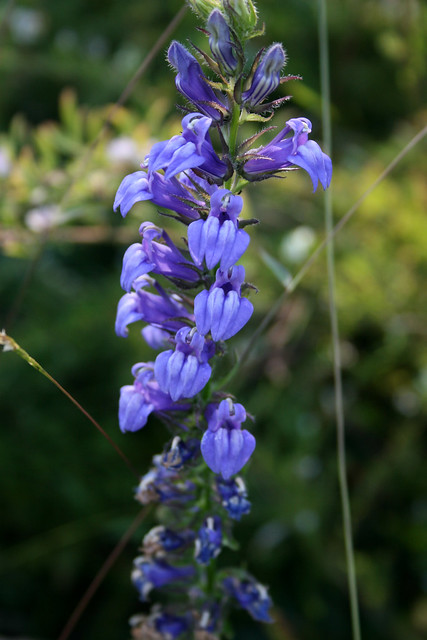
Great blue lobelia, Lobelia siphilitica, at forest edge.
(*photo credit)
July 2, 2014 Pro-Life Involves a Broad Agenda
How could one be for saving our wounded Earth and not be pro-life? The vitality of our planet is associated with that of all the people who inhabit this fragile world. Just advocating for all aspects of human life from conception to death does not stand alone, as though there is a dividing line between the human and non-human on our Earth. Rather, we all know that without a viable planet our human quality of life would deteriorate and end.
The strategy of many traditional pro-lifers is to express doubts that expanding the life arena will water down or weaken traditional life/death issues generated by Roe v Wade. The early efforts to include peace issues (Cardinal Bernardin) had both acceptance by some but fear by others as distracting from the main issues in their agenda (abortion and mercy killing). Now the expanding of the discussion to capital punishment also had some but not entire resistance, mainly because the first ray of hope was that traditional liberals and conservatives could unite on a life issue, and especially when DNA samples were determining that dozens on death row throughout the country were actually innocent. Furthermore, other civilized nations abolished the death penalty. Why shouldn't the other 32 U.S. states do likewise?
Climate change concern raised new pro-life expansion of concern. Here "red-state" pro-lifers voiced objection. To go beyond the human has no end in sight, and many of the pro-life base felt threatened. Environmental concerns about the vitality (that is, life) of the planet affect current and future generations; it will impact the poor who cannot flee the global flooding of urban areas as will wealthier inhabitants. Climate change deniers are heavily influenced by merchants of doubt paid by Big Energy to prolong fossil fuel profits. For the deniers it must never be to bring environment under the pro-life umbrella. However, to expand so-called conservatives into the green movement would in a real way make the issue a win-win one. Environmentalists ought to broaden their sphere of influence in critical times.
'It is the economy stupid.' Those who have propagandized the general public into "no new taxes" (because they do not want to pay their fair share) must be challenged. The pro-life conception-
to-death broadening invites a broad range of people who were formerly neutral at best into the fold. Morally, if life is degraded or damaged, threatening conditions must be addressed. And climate change, with over 98% of scientists agreeing that it is human-caused, becomes a major pro-life issue. Objections to this lack a moral basis and only have a perverse economic motive that benefits a privileged few. Threats to the environment through excessive greenhouse gas emissions must be challenged with all tools possible. And broadening the pro-life agenda to include anti-governmental types is praiseworthy and necessary, for more and more must take up broader issues.
Prayer: Lord, help us to respect life in all its forms.

Vine-ripened fruit of the native Kentucky passionflower.
(*photo credit)
July 3, 2014 Bringing about Fair Taxes
Don't forget the first July Fourth was about taxes. Now we ask: Why do billionaires exist? There are two ways to save the soul of a billionaire or millionaire: one is to persuade them to become a modern St. Francis of Assisi; the other is to impoverish them to be more on par with the rest of us. Both getting them to give up their wealth and taking their wealth for better causes are authentic Christian undertakings. Fairness of taxes would eliminate billionaires because the lower- and moderately-incomed are unfairly taxed while the rich run away with loot. Recall the System was composed through sacrifices of citizen taxpayers. The privileged few live off the public's permissiveness for they, as wealthy controllers of the System, get their public relations lackeys to ensure unfair tax breaks and investments at two-thirds the rate of average citizens. They also insist that "NO NEW TAXES" apply to all -- their only nod to equality -- for they want to continue to receive benefits and ensure Congress members are subservient to them. The lower incomed proportionally pay higher taxes.
Why revolt in 1774-6 and not today? The answer is that the public today is far less radicalized than they were 240 years ago. How could scattered American colonials be so concerned then except that they were freer in forming their own opinions? Thus our current "patriots," with multiple information sources do not realize how the unfair tax system disrupts the democratic process and how the profiteers of unequal wealth can captivate simple folks with their propaganda. The wealthy influence the 99% underlings to such an extent that many buy their American Dream carrot.
Estate taxes. The wealthy one percent press to have tax benefits include the repeal of federal estate taxes, although only paid on inheritances of more than two million dollars. And the targeted one percent, through access to the media and by disinformation, label the federal estate tax as the "death tax." Moderate-income folks on learning aspects of fair tax laws realize that they or kinfolks would never have such privileges; they begin to see that this country, which lives on borrowed money, will in one decade lose one trillion dollars in that one legislation.
Citizen demands. Our essential needs can only be met by taking from the wealthy what belongs to the commons -- the people. We cannot wait until the rich are moved through charity to share, for that is an exercise of raw power. Why is extreme wealth allowed for a few and extreme poverty for the many? The great equalizer is an authentic and just tax system -- and that is what the dream of the colonists was, a dream fading from our collective memory. Let's remind ourselves of that dream of fair taxes on this July Fourth. It's called "civic responsibility;" tax loopholes need to be removed, but that is a difficult and unpopular task.
Prayer: Lord, teach us a sense of fairness and to be people
who regard firmness of purpose and justice for all as virtues.

Nature's "fireworks" - the blazing sunflower.
(*photo credit)
July 4, 2014 Today, We Ought to Recall America's Blessings
Lucky this year, the 4th of July is near a weekend and this allows many a longer period of celebration with a variety of visits, trips, picnics, fireworks displays, and other forms of festivities; all well and good, but maybe there is something more. On Thanksgiving, civic piety calls for prayers before the main meal and perhaps even a thanksgiving service at church on or around the day. Independence Day is also a major American national holiday, but with limited attentions to how much sacrifice was demanded for that first Declaration of Independence and the uncertainties involved. Some two hundred and thirty-eight years ago those founding parents put great trust in God to help see them through.
At the 200th anniversary of the Declaration of Independence in 1976, I was a DC resident and able to celebrate at the Mall with one million or more citizens. What a crowd! I remember looking to the Federal Capitol and watching attendants frantically hoisting up and down flags that some souvenir hunters would boast flew over the building on July 4, 1976. So much for distinctions. We parked in a convenient spot near the State Department building and when the fireworks had ended after dark, a sea of returnees was completely filling the street where the car was parked. We walked a mile to another vehicle and had to come back the next day to retrieve my car. So much for July 4th celebrations.
Today, America continues with its heavy debt, paralyzed Congress, and threats to its democracy from the wealthy elite. We also have a world of uncertain change, a closing window on global warming, fossil fuel problems, lack of migration reform, and a host of social problem areas. However, we must not allow these to crowd out our own blessings that we need to recall prayerfully. Many curse little things but fail to discover and acknowledge blessings. This is an anniversary of our freedoms -- speech, press, worship, from unlawful search, though it took a few years to recognize them in an imperfect union containing slavery, biases, and disregard for Native Americans. We do have blessings that we overlook and fail to take the time to enumerate. Is it because they are countless?
Our blessings as an American people include: universal inoculation programs, a network of relatively safe highways, quite reliable weather reporting and alert facilities, good telephone and communications networks, affordable personal computers, regular and mostly dependable garbage collection services, 911 rapid responder organizations, plane and helicopter services, reasonably alert police, reliable and properly labeled food, efforts to restrict and eliminate smoking, social benefits for the lower income, food for those in immediate need, a well-regulated militia and military, a long and dependable postal service, and on and on. Yes, these need a vigilant citizenry to monitor. But God is the author of all blessings and worthy of our praise and gratitude.
Prayer: Bless us, O Lord, for these thy gifts which we have
received and are about to receive through your bounty, amen.
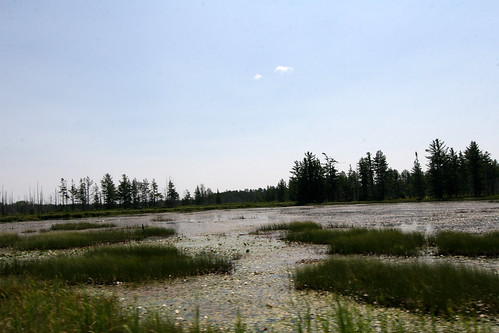
A tranquil place for recreational swimming.
(*photo credit)
July 5, 2014 Spectator, Competitive, and Recreational Sports
The eyes of the world are turned to this ending of the World Soccer Championship in Rio with surviving national teams moving to that final streak of fame, glory and World Cup. In a rather general way, it is good the world can focus on non-warlike issues for a brief moment and find a desire to enjoy talent, no matter which side we are on. Togetherness has a value even when sides appear and struggle for special titles. Many live in their local worlds and find it exciting to cheer with strangers having similar interests. Should we digress and treat sports more critically?
Spectator sports are what we all participate in to some degree right now with only a few talented players televised and watched with immense scrutiny. However, we are the cheering multitudes as though our voices before our TV screen make a difference. We have our local, regional, and national biased allegiances, even if the other team is better. Boosterism trumps athletic excellence. Unfortunately, this adherence to patriotic fervor does little for personal physical exercise except for shouting or chanting throats and aching lungs. Is this really sporting or a lucrative show of partisanship and profiteering? Nerves get frayed if onlookers are deeply involved in a victory. But how important is camaraderie?
Competitive sports today have a universal appeal, or so it seems, for even Pope Francis cheers on football (soccer) teams of his liking. Certainly a more universal outlook is to see the best team, not one's favorite team, win. Local favoritism can enhance a community spirit but one should also applaud the talent of opponents even when difficult to admit. Spectators can become crazed enough to riot and have in the past shouted for death to opponents in old Roman gladiatorial events. Today's sports and demands for coaches to win skew attention away from admiring individual talents as in the past, witnessed by ancient Greek laurel crowns. Today, sports involve lucrative contracts, arenas, and TV rights. Marathons have become global promotion schemes and media hype is geared to advance the consumer culture.
Recreational sports include the moderate spectator and involve competitive arenas. A greater sports benefit is in the form of needed physical exercise along with a chance to get fresh air and release of tensions. Through personal choices of sports we have opportunities to "stay in shape." Recreational sports can be wholesome, participative, and balanced and need not be competitive by nature. Why defeat others? One can have as much fun in a wide variety of sports without rendering another a defeat. Take hiking, fishing, boating, water rafting, sightseeing, and many others. These can be enjoyable and yet we struggle with our own internal demand for completion, not besting others. Doing things without the added motivation of defeating another allows all parties to come away feeling fine. Let's do our own sporting thing and enjoy it.
Prayer: Lord, help us to find sports to be enjoyable but not necessarily at the expense of others. And may the best win!

Honeybee on wingstem, Verbesina alternifolia.
(*photo credit)
July 6. 2014 Time for Spiritual Refreshment
Come to me, all you whom labor and are overburdened, and I will give you rest. Shoulder my yoke and learn from me, for I am gentle and humble of heart, and you will find rest for your souls.
Yes, my yoke is easy and my burden light. (Matthew 11: 28-30)
On Peace Sunday and in Ice Cream Month we need to realize that summer is upon us. We need periods of refreshment, when we are at peace with ourselves and can stop and catch our breath. Besides, that is what Sabbaths and Sundays are all about. For times when we think we can continue without a break, we fool ourselves; we need to preserve good health whether physically, mentally, or spiritually. For those of us in the Northern Hemisphere and with summer heat coming on in full force, July is an ideal time to allot periods for refreshment -- for we are human. We know too many examples of stressed Americans. Do we have a culture that is overworked? Do we set aside times of the day or a week in the season to stop, take in the shady place, relax, and forget to plan the next precise moment in the given day?
While this was first drafted three months ago, still if alive and able, today I am starting my annual retreat. This is something I always look forward to because it exceeds the daily or weekly pauses with a longer period of rest. This is the pause that spiritually refreshes the soul -- and I am always thankful for the opportunity. It may be the last, as so often Pope Saint John XXIII often noted in his retreats. Make it the best as our mortal time span shortens. My preference is the woods setting within my parish boundaries -- the Red River Gorge Wilderness Area.
The soul needs rest as much as the body. We deliver services but they become too routine without breaks. Our spiritual communication must be a two-way street, namely, realizing our receiving from and giving to the Lord. God is the author of all good gifts and with time we have shortness of breath. This means we must pause more often as we age and refresh on the spiritual energy to continue the journey in life. The road is not empty if we pause to look and see that Jesus is our companion along the way. The quote at the beginning tells us so very much about burdens.
Doris Kerns Goodwin's book, Team of Rivals: The Political Genius of Abraham Lincoln, describes the personalities of Lincoln's cabinet members. Some, including the President, took time in the day to relax in their own way. Secretary of War Stanton did not -- and he was difficult to work with. He was always uptight even though he did a great job. Like him, we need the breaks that come with continued work, and we need them because of our important service for others. The annual retreat or other breaks that people take need not further justification. We who are Christian are blessed in the special way that our breaks are taken in the refreshing companionship of Jesus, the bearer of our burdens.
Prayer: Lord, help us to spend time refreshing ourselves.
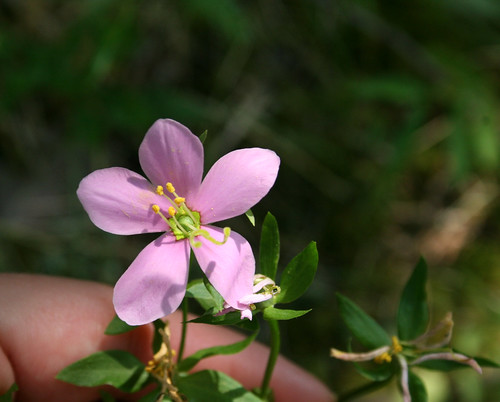
Rose pink, Sabatia angularis. Rockcastle Co., KY.
(*photo credit)
July 7, 2014 College Debts and Ongoing Educational Programs
Proper reflection for all parties is highly needed when it comes to colleges. Without such, tuition could become a racket that can saddle people with debt for years to come. The climbing cost of college education causes a dilemma for many with modest incomes, whether high school graduates wanting to enroll in colleges, middle-aged people desiring career changes, or older retirees who want to complete some further studies. Much depends on a combination of academic expectations and high tuition costs.
Wait and see. A high school graduate who is bright but not overly so, and is lacking an opportunity to get major scholarship assistance and grants, may choose to delay college and seek employment or technical apprenticeship to gain experience. During this time one's plans may become more clearly focused and some searching and discussion is in order. Counselors and school advisors could prove extremely valuable in this phase of life, for far too many launch into expensive college unprepared. Others who have planned and started a career would be sought and questioned.
Review and refocus. The person seeking a second career may regard future job prospects as a prime consideration. On-line and at times low-cost preliminary courses can help narrow choices; extension course, community colleges and even higher powered courses on line could be helpful. Physical attendance for non-laboratory courses with all the commuting, parking, and time constraints are not that demanding today; on-line courses and even degree programs are readily available through a short Google search. Some are asking about the cost of keeping college physical facilities in top shape at high maintenance costs.
Broaden outlook. What about retirees who may want a new or higher degree or some cultural program? Some state programs offer low or no tuition for seniors and retirees (Kentucky's Donovan Scholars Program). Older people may desire to keep their minds active through courses offered near home, but that may be limited. Again a proliferating search of Internet can come to the rescue.
How about considering courses offered through The Teaching Company?
Leisurely low-cost college routes we experienced in the mid-twentieth century no longer exist. "College" is costly business and is rapidly becoming a privilege of the brightest or wealthiest, for the prestigious route is narrowing rapidly. However, the informal alternatives are far more available than in times past and with proper selection in non-college formal degree programs one may regard education as a lifetime pursuit without tremendous up-front costs, with all the pressures associated. Creative folks could avoid boring classes, association with unprepared peers, and a crippling debt load. Certainly, motivated people may go far on their own educational course when disciplined and alert.
Prayer: Lord, inspire people to reflect on their educational
route and to seek assistance along the way.

Bumble bee mimic, Laphria genus.
(*photo credit)
July 8, 2014 Promote Geothermal Applications
We speak much about renewable energy and yet often overlook a small but significant contributor to our total American energy picture: geothermal energy. This is essentially a renewable energy source that does not always have to be recharged. Furthermore, geothermal is an environmentally benign, non-polluting form of energy that, once tapped, can be quite dependable and low-cost. Many of our western U.S. states are particularly well suited to utilizing this form of energy and are already doing so. The process of utilizing Earth's heat can be subdivided into two major areas of application: electrical generation from hydrothermal fluids (steam or water), and direct application in residential, industrial and commercial uses such as greenhouses and fish farms; and geothermal (ground source) heat pumps, which are highly efficient, and are regarded as an excellent way to concentrate naturally existing heat without using much if any fossil fuels.
Electricity generated from geothermal energy is potentially available in various parts of the world. Iceland gets 17% of its electricity from its geothermal sources, and about two dozen other nations are taking a serious look as global petroleum prices rise. Last year, total U.S. electricity production installed capacity from geothermal sources was about 3,386 Megawatts (MW), of which 80% was in California. A major source of this was from the Geysers (a dry steam field) in northern California. In part, treated sewage effluent was injected into the geothermal field and replenished steam tapped for power generation. In 2013, Nevada had an installed capacity of 517.5 MW with a majority of the current plants now under construction. Western states (UT, ID, OR, HI, AK, and WY) have large amounts of 200 degree plus temperatures at six kilometer depth and thus are suitable for geothermal utilization.
Heat exchange systems in residences and commercial establishments have gained in popularity throughout the United States. These systems use ground or water temperatures of a minimum of 40 degrees Fahrenheit to concentrate heat through a heat pump. Actually the application is not new, for the Greeks used geothermal heat to furnish hot baths over two thousand years ago. The current exchange systems are becoming more efficient, but they do not stand alone; they require other sources of electricity to operate, though at far lower electric use than heating by a resistance heater or cooling by a standard air conditioner. In fact, the U.S. Department of Energy identifies water-based geothermal heat exchange systems as the most efficient and cost-effective way to heat and/or cool buildings. Having said this, appropriate technologists still advocate heating through the use of solar energy and cooling derived from nearby shade trees as being even more cost efficient. Still, geothermal in all its forms is a heating source with a bright future in the age of climate change.
Prayer: Lord, help us see the good before our eyes and to turn attention to environmentally benign energy sources such as geothermal energy so we can curb the threat of climate change.

Wild huckleberry and blueberry pie. Sylvania Wilderness, MI.
(*photo credit)
July 9, 2014 Be Satisfied with the Taste of Seasonal Berries
Among the joys of summer are the multicolored, multi-flavored berries that are found wild or in cultivated varieties during July. So many varieties grow in our area that we feel overwhelmed by the bounty. Picking a few berries for my own or others seasonal taste is just right, but collecting quarts and gallons becomes labor of a difficult sort -- especially for older folks. A good taste is enough, and offering some for others to enjoy seasonal berries is a good deed. Many berries will spoil quickly if not eaten or quickly refrigerated. They taste best right off the vine.
Actually, berry seasons differ. In this area we are past the wild and cultivated strawberry season (May-June) and have gone beyond the wild or black cap raspberry (late June), though cultivated raspberries may come in two seasons, and some of both species (strawberries and raspberries) are ever-bearing during warmer weather. July is the season of the bramble or blackberry (wild but also cultivated varieties), the wineberry, the bush blue berry at lower altitudes, the dewberry, and the cultivated boysenberry and gooseberry. The white and dark mulberry trees are also bearing during "high" berry season. Later will come the elderberry, the cranberry, and numerous others.
My favorite July berry is the luscious wineberry (Rubus phoenicolasius). These ripe juicy red berries remain on the canes for a short time and their ripening season is less than that of the blackberry (a two-week interval). Their brambles do not have the thorns of the blackberry bramble though the stalks are rough. The berries are almost hollow and delicate, being meant to be eaten on the spot for they do not last long after picking. They are of medium tartness and have a distinctive flavor. They are an exotic species that was introduced and proliferate where allowed to spread unhindered. Was Thomas Jefferson their first proponent?
Part of the secret to berry-gathering is to know where the sweeter and higher quality ones grow. This takes an observant eye and good memory. The truth is that the majority of wild berries go unharvested even in rather congested areas, because people ignore these gifts of nature and shy from thorns and snakes. The quality of a berry crop depends on a suitable flowering season (no late cold weather) and on soil and moisture content of the growing place. So berry pickers must ride with the annual tide.
Though ripe berries right off the vine have much to promote, still gathered berries can be turned into a variety of wonderful dishes, such as fresh with sugar and cream, with cold or hot cereal, or baked as cobblers, pies, puddings, muffins, as ice cream toppings, sherbets, as jam, jelly, canned whole or simply preserved in a deep freeze for later use. It takes an art to retain much of the sun-ripened flavor.
Prayer: Lord, teach us to enjoy the good things of life and
bless you for directing us to the berry patch.
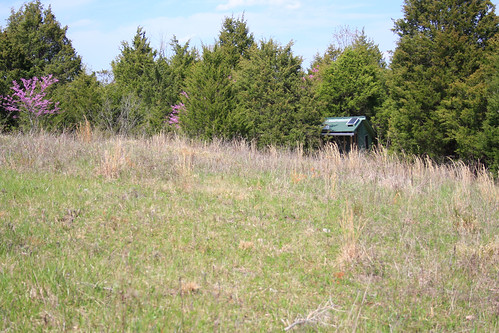
Retreat cabin in rural Kentucky setting.
(*photo credit)
July 10, 2014 Retreat Choices within Nature Settings
Where one makes the annual retreat has much to do with its successful outcome. I say this hesitantly, since many traditional retreat houses will consider this an anti-commercial. So be it! Questioning the raison d'etre of expensive retreat settings is part of my radical calling. A well-heeled place surrounded by manicured lawns and affording ample well-cooked meals only enforces the consumer culture in which we live -- and thus for the greater part means catering to the business and upper income strata of society. Why not find God who created natural things, for a short while apart from distracting human artifacts?
Nature gives a completely different perspective for our annual auditing. It may be necessary in change of life circumstances that we seek assistance of a spiritual director, and his or her convenience demands special site choice. But in the routine years, how can we consider assisting our poor brothers and sisters in a higher lifestyle retreat setting? Virtually impossible! If retreatants remove themselves in a segregated fashion from the poor too distantly and thus regard the unhindered circumstances as places to find God, they could be disappointed. A retreat is where one meets God and we ought to consider meeting God where our neighbors are. Yes, if nature's creatures (animals and plants) are neighbors to us all, then we are meeting God in natural settings if we look out and see. Excessive artifacts could distract us.
Granted, some retreatants may want to stay in a room or chapel the entire retreat and let others make the beds and do the cooking. So be it! However a majority prefer to move about a little and natural settings offer the invitation to avoid the human congestion. Actual movement and periods of rest in the woods is an excellent alternative. We could park ourselves over a single ant hill to gain perspective. Moderate exercise in fresh air and sunlight keeps us refreshed and could help us improve our prayer periods. Some that prefer hiking retreats find a totally new perspective and pour gratitude for greenness of forests and blueness of sky overhead. Backpacking retreats may become too exerting and so strolls are not hindered by a heavy pack, just the bare hiking elements of lunch, water, notebook, and rain gear.
Choice of a natural site will also include simple location, lower cost meals, and rustic lodging. Simple food fare is utterly important, for feasting during retreats is not attending to personal spiritual needs. Even a certain amount of human "grazing" in the wilderness establishes our sense of place when we eat berries grown in the area. Choose a place that is simple but good for reflection, for some places are more conducive than others. If you wish to tent, there are many parks, camps, farms, and out-of-way places. Tenting gives us a closeness that built-up places simply do not give -- though take enough matting for restful sleep.
Prayer: Lord, inspire us to take time each year for spiritual
auditing, but to do so in settings as simple as possible.
![IMG_0017[1]](https://farm3.staticflickr.com/2924/14438523285_f3716efe92_z.jpg)
Quiet pond for reflection. St. Elizabeth of Hungary Church, Ravenna, KY.
(*photo credit)
July 11, 2014 The Quandary of Transporting People
People move from place to place in their mobility, but this freedom does not come without resource costs in transport means. We might preach to deaf ears to stay at home, but fear of being hypocritical make me hesitate. To say "stay at home" when the urge is high to move about quickly and conveniently gives this a hollow sound. Vacationing, studying, working at home or working always has limitations. Travel by foot, bike, or even by horse or sailing ship were favorites in another era.
Modern human travel involves fleets of cars, trains, buses, and airplanes, and the first and last are quite resource intensive. We hear the advertisement that it takes one gallon of fuel to move one ton of freight by train 450 miles. My, that is resourceful! If I weigh one tenth of a ton and drive 450 miles in my fuel-efficient hybrid, it still takes 115 times the fuel in contrast to that freight train -- and much less if traveling by non-air mass transit. Certainly humans are not freight, but energy to drive or fly consume fuel resources.
The world is rapidly moving to an automobile economy, as China has abandoned the bike and is now the world's number one auto purchaser. Is that really a good thing? What about all the petroleum, even if their autos are fairly fuel efficient? What about the growing traffic jams that all global urban areas are now experiencing? Do emerging countries have the infrastructure to meet private vehicle traffic demands? The U.S. Department of Transportation has estimated that costs of traffic jams amounts to $65 billion each year and include 2.3 billion gallons of fuel and 3.7 billion hours of time. Now what about a world of traffic?
A plentiful supply of petroleum is being drilled today but for how long? Will the world choose to tackle tar sands petroleum with its wastes in processing, transporting, and refining -- all hastening the day of catastrophic climate change? Doesn't this have immense environmental costs as now confront us who oppose the Keystone XL Pipeline? Will we settle for cleaner (perhaps) but more plentiful natural gas in liquefied form for running vehicles, or is this feasible for the growing global fleet? What about electric cars that are coming at a rather slow pace, but still nearing 1% of total market today? Our ASPI solar car of two decades ago was recharged by electricity from solar panels while it was parked and that offers some human transport promise. Or are we going to seek other renewable alternative sources to replace fossil fuels? And will these be free of greenhouse gas emissions?
On the optimistic side, people know that some of these renewable fuels are available with beneficial characteristics. These may prove a transition means before total electric cars fueled by solar energy. Let's consider their pluses and minuses.
Prayer: Lord, help us as pilgrim people to do our moving about with the least impact on available world resources.
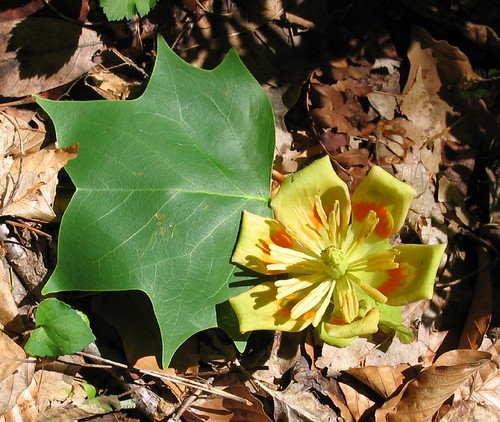
Tulip poplar flower and leaf, Liriodendron tulipifera.
(*photo credit)
July 12, 2014 Alternative Biofuels Are Available
Climate change fuel choices must focus on low or no carbon dioxide and other greenhouse gas (GHG) emissions. Several exist with both good and bad effects when treating the internal combustion engine. A decade ago the EU wished to make biodiesel (from waste cooking oil and virgin sources) 6% of the total energy mix in the next decade; this was received in horror by those knowing that palm oil production could drive deforestation in Malaysia, Indonesia and other tropical lands. At the same time Brazil wanted to power four out of five of its transport fleet fueled with ethanol derived from its homegrown sugar cane -- and thus remove it from the food shelves. All the while the corn growers in the U.S. relished the mandate to use 10% and higher ethanol content (from corn) in the massive American auto fleet.
Palm oil, sugar, and corn are ingredients in basic foods for hungry people -- and the competition for use in inherently wasteful internal combustion engines seemed "corny" to some, to say the least. Using waste cooking oil for fueling vehicles has at least some beneficial effects; gathering waste cooking oil from a variety of restaurants and food processing industries is time consuming and of limited amounts. The inconvenience is gladly undertaken by advocates or "green biodiesel missionaries;" these true believers strain waste oil and use it in diesel-burning cars or trucks; the fuel runs well with no engine damage and emits the pleasant fragrance of a McDonalds' kitchen.
Ethanol, proposed formerly in auto fuels to raise octane ratings, accounts for over a quarter of recent years' American corn harvests, and fuel demands keep corn prices high. However, agricultural waste by-products such as straw or corn stalks are a far better (by social justice standards) source of ethanol than corn. New methods are available to use fungus that can decompose the straw into basic sugars and separate this from the lignin for fermenting into alcohol. Unfortunately, it is only slowly becoming a commercial competitive fuel source. Undoubtedly, higher production scale means lower prices. Business interests are making plans for the advent of a variety of cellulosic-sourced fuels.
Native fast-growing plants like switchgrass (a weed in common terminology) and short-rotation woody crops like poplar trees could be produced on reclamation sites and marginal lands in much of the American Heartland and South. This would be an answer to using fertile agricultural lands for petroleum alternatives. Some of these plants grown to produce liquid fuel would not require fertilization or pesticide control or tillage, and would not be a net increase in GHG. While sounding good, still combustion is not a solution to global warming. Stable forests improve total stable biomass. Let's promote renewables to charge batteries on electric vehicles as the best route to the auto future.
Prayer: Lord, help us keep food for hungry people and find alternatives for hungry vehicles that must be on the road.
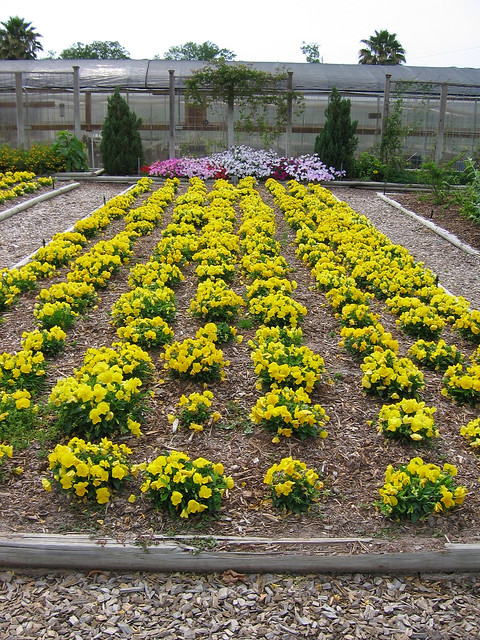
Neatly planted rows of emerging blooms.
July 13, 2014 Reflections on Sowing and Reaping
Other seed fell on rich soil and produced their crop, some a hundredfold, some sixty, some thirty.
(Matthew 13:8)
Sowing and reaping are different activities leading hopefully to the same goal: a fruitful crop. In cases where sower and reaper are the same person or groups, then we still detect mood changes in the starting and finishing operation. At the start of the growing season we are never sure whether the seeds will sprout, adequate rain will fall, and the plants survive and prosper through to ripening and harvest. Even at the golden time of fruitfulness mishaps, such as wind or hail, could damage the crop.
The sower is investing in precious seed in hopes of that multiplying effect, which for many poor and small farmers is the difference between plenty and scarcity. The vulnerability of being at the mercy of weather and other elements is greater in the early growing season. As a successful growing season culminates, the mood of the harvester changes to one of cheerfulness, even when the operation is hard labor. Joy and excitement begins to fill the air at harvest time. Generally sowing involves a single person but, in simple rural societies before combine, harvesting included entire families and neighbors as well -- a major social event.
Spiritual life for each of us individuals is also like the growing season. We start with the beginning of our growing season of faith in the pains of a mother giving birth. This was followed by the joy of spiritual rebirth in Baptism along with hopes of advancing in age and wisdom. We weather the somewhat unpredictable storms of childhood and adult years and find the detours and rough edges of life. During the mature ripening season we take or miss the opportunities of assisting our neighbors in need. The golden years produce the seeds of our love for others and this involves the happiness of knowing we are doing God's will. In due time we pass on in a happy death and hopefully leave a legacy of good will.
Spiritual life of a community has much the same moments as do individuals. Sowing and starting something includes the concern as to whether it will endure. Often in communities, the maturation involves lifetimes and so those who sow are different from those who harvest. Jesus says, For here the proverb holds good: one sows, another reaps; I send you to reap a harvest you had not worked for. Others worked for it; and you have come into the rewards of their trouble. (John 4: 37-38). Often we find it hard to even estimate when success is achieved and so reckoning is left to God, for outcomes may be seen in a different divine light. Certainly, within a vital community growing season we can become sower or reaper; we accept what is needed at a given time, for all laborers are to be thankful of the privilege of being able to work for the Lord. Both are worthy of sincere laborers.
Prayer: Thanks Lord, for being able to work for you, wherever we are in the seasons of individual and community life.

Fields of grain, solitary poppy.
(*Photo by Arne Winter, Creative Commons)
July 14, 2014 Grain Threshing Memories
Following yesterday's homily on sowing seed, we stay with harvesting grain. This allows us to recall farming practices encountered in youthful years and now remembered by only a small minority of America's population. The farm tools of seventy years ago are now displayed in museums: the scythe, corn jobber, corn sheller, and grain thresher. One of the great agricultural events of the summer was threshing wheat and other grains. It actually became a gala celebration, for neighboring farmers and hired hands worked and enjoyed each other's company in a gigantic noon meal.
These pre-grain-combine days (during the Second World War) were county events that occurred generally in mid-July on hot summer days. We always prayed for good weather, both on the threshing day and the week preceding it, for the grain had to be dry. The harder part of the total operation involved the cutting of the wheat by a horse- or tractor-drawn binder; this made bundles of wheat, which were stacked in "shocks" in the field. The threshing itself was less exerting than the cutting, at least from a youthful standpoint, as we enjoyed free time between the loading and unloading of each horse- or tractor-drawn wagon.
The center piece was the cumbersome threshing machine with its large pipe for blowing the straw onto a straw stack created by the occasion. Mr. Lurdy, our school driver, was the thresher owner and principal operator. These mobile devices were originally driven by a steam engine, but in our time the large tractors were run with diesel or gasoline. Our state law says such a machine could cross other people's property to get to the site, for in roadless country moving the machine from place to place was a challenge.
I will never forget Skinny, a hired man at the farm next door who was a perfect showoff. He liked to drive his tractor and loaded wagon of wheat sheaves up to the thresher with his arms folded while he controlled it using his feet touching one or other of the two tractor brake pedals. Mr. Lurdy, who was concerned about the safety of his precious thresher would show a face of pure alarm as Skinny's wagon approached.
And then came the big noon meal. Pans, soap, and towels were set out on the cistern top and everyone could wash their hands, arms, and face before feasting. Women folks (a number enlisted to help) would prepare chicken and a lot of the seasonal vegetable dishes including new potatoes, cucumbers, beets, green beans, and fresh tomatoes. There would be blackberry, apple, and peach cobblers for desert and plenty of lemonade and coffee. The lunch talk was filled with laughter and good cheer, for the rest of the day involved afternoon hauling to the thresher and sacking the threshed wheat. Since our threshed wheat was a good quality, some went to the local feed store as seed; the rest was stacked in the barn in ricks of sacks and later crushed for livestock feed.
Prayer: Lord, refresh us with the joys of the harvest season.

Common ragweed, valuable wildlife plant, native to Kentucky.
(*photo credit)
July 15, 2014 Abolition 2000 Statement
A secure and livable world for our children and grandchildren and all future generations requires that we achieve a world free of nuclear weapons and redress the environmental degradation and human suffering that is the legacy of sixty years of nuclear weapons testing and production.... We urge the states parties to the Non-Proliferation Treaty to demand binding commitments by the declared nuclear weapons states to implement these measures:
1. Initiate immediately and conclude negotiations on a nuclear weapons abolition convention that requires the phased elimination of all nuclear weapons within a time-bound framework, with provisions for effective verification and enforcement.
2. Immediately make an unconditional pledge not to use or threaten to use nuclear weapons.
3. Rapidly complete a truly comprehensive test ban treaty with a zero threshold and with the stated purpose of precluding nuclear weapons development by all states.
4. Cease to produce and deploy new and additional nuclear weapons systems, and commence to withdraw and disable deployed nuclear weapons systems.
5. Prohibit the military and commercial production and reprocessing of all weapons-usable radioactive materials.
6. Subject all weapons-usable radioactive materials and nuclear facilities in all states to international accounting, monitoring, and safeguards, and establish a public international registry of all weapons-usable radioactive materials.
7. Prohibit nuclear weapons research, design, development, and testing through laboratory experiments including but not limited to no-nuclear hydrodynamic explosions and computer simulations, subject all nuclear weapons laboratories to international monitoring, and close all nuclear test sites.
8. Create additional nuclear weapons free zones such as those established by the treaties of Tlatelolco and Rarotonga.
9. Recognize and declare the illegality of threat or use of nuclear weapons, publicly and before the world court.
10. Establish an international energy agency to promote and support the development of sustainable and environmentally safe energy sources.
11. Create mechanisms to ensure the participation of citizens and NGOs in planning and monitoring the process of nuclear weapons abolition. <www.abolition2000.org>
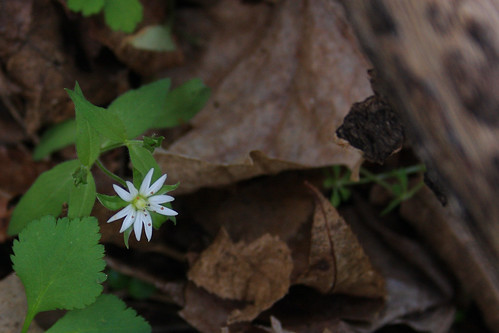
Star chickweed, Stellaria pubera.
(*photo credit)
July 16, 2014 Global Child Health Care
Over half the human race that is now alive either were not born or too young to remember the beginning of the 21st century. Yes, we elders have to term half the world's over seven billion as "Youth." Healing our wounded Earth can be partly but not totally performed by adult caregivers, but these youngsters will become the adults in only a few short years. Their health is of utmost importance if they are to become the health providers of our wounded Earth. Furthermore, their wellbeing is a global concern, even though much of what needs be done to keep them healthy must be accomplished at their local residence.
Consider eating habits. Step into a fast food establishment and watch youth (and elders) chomp the burgers and fries. How can we influence proper choices for proper body development? Where will they learn about fresh fruit, vegetables, nuts, and whole grains except in homes, schools, and the media? The health of American youth involves refraining from junk food and choosing good balances that will limit obesity and related ailments. Banning sugary soft drinks in schools is a good start. What about those who do not have nutritious diets, suffer from malnutrition, and go to bed hungry each night? Especially what about the 12 million orphaned by AIDS in Africa or 1 million young Syrian refugees?
Consider general health care. A majority of children throughout the world get proper vaccination for numerous illnesses, but this rather low-cost child protection is not available in certain countries often because of fear of inoculation procedures by parents or local authorities. Several diseases considered almost conquered have reappeared such as polio, due to break down in health systems. The World Health Organization is striving with resources at hand to keep vaccination programs available for children everywhere. Protection against all forms of tropical diseases that cause blindness and other crippling effects could be eliminated with proper funding resources, if medicine development and distribution were available.
Consider proper exercise. Obesity is rampant in America and among youth of other affluent nations. A more sedentary life among youth attracted to videogames and texting adds to the threat to their physical health. Average non-farm youth today are not getting the amount of exercise we experienced as farm youth. Certainly the possibility of good health is better when youth do not have to work from dawn to dusk in a factory, as often occurred in the 19th century. But, on the other hand, those sitting before a screen and pretending to be doing some sort of exercise are living in a dream world. Older youth with free time on their hands are tempted to drugs and substance abuses. Much of what is today going for military expenditures would yield far greater security if these funds were funneled to health care for the young.
Prayer: Lord, help us to see that caring for our youth is good preparation for them becoming healers of our troubled Earth.

Elegant moth on window.
(*Photo by Sally Ramsdell)
July 17, 2014 China: Don't Follow Our American Ways
China will soon move from second place to leader in the economic world and dominate the 21st century. We hope Chinese imitate America in some ways such as personal freedoms, but not all ways. Hopefully, China will NOT follow our consumer practices lest the world will be severely damaged by the environmental consequences. Unfortunately, in our materialistic global culture it is the wasteful ways that are followed. China has a very noble and ancient culture and needs the spiritual resources to distinguish the good from the bad. The world cannot afford another U.S. and China has four times the number of Americans.
* Don't enter our private auto economy (even though you are now number one "auto market" in the world). Private internal combustion vehicles take enormous amounts of metal and plastic to produce and rubber and petroleum to operate -- along with highways, parking spaces, and service stations. Continue to improve your mass transit systems and hope we follow. Don't decimate farmland into housing and then spend hours commuting from home to work.
* Don't go fast food. Preserve your excellent cuisine (my favorite). Rising income and busier schedules make it a temptation to eat burgers in hurried moments between work sessions. China now consumes more meat than the U. S. and any other nation, but that's expected with four times the population. Why follow fast food's habits, for grain-fed cattle take much more resource than simple veggie/grain meals? Champion less resource intensive foods.
* Don't excessively heat and cool. We Americans have developed a low threshold for discomfort, namely, hot in summer and cold in winter. We heat excessively in winter and that is unhealthy as are our cooling practices in summer. That is a costly resource practice that we wish on no other, especially when weather conditions between China and the U.S. are so similar.
* Don't expand indoor space requirements. We Americans doubled the interior space in residences, commercial establishments and educational institutions (per capita space) in the past three decades. Thus, this resulted in increased demands for construction materials and cooling/heating energy. Digital purchases remove the need for spacious big box stores. Trends here are for more space in educational, worship, entertainment, and work facilities. Why?
* Don't become a throwaway culture. We Americans dispose of used computers, cell phones, and other electronic devices as newer substitutes appear. The same holds for clothes, furniture, and vehicles. We dispose of plates, cups, wrappers and two dozen items from each fast-food lunch, many of which are scattered in the countryside where plastic decomposes at a slow rate. Disposing your chopsticks could denude the world's forests. Reuse.
Prayer: Lord, help us to work with other peoples in becoming resourceful for the sake of our own troubled Earth.
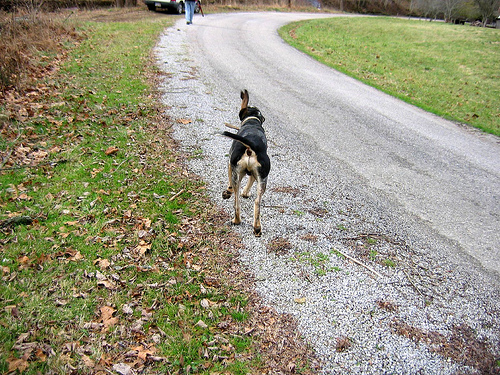
Following her friend along an Appalachian road.
(*photo credit)
July 18, 2014 Appalachia: Positive and Negative Challenges
Some well-meaning people in our region are planning an "Appalachian People's Pastoral." I do not mean to disparage such efforts for they are well-intentioned. However, ultimate success depends on several factors worth mentioning, for to say wrong things can produce negative effects in a region in desperate need of assistance and dialog. Authentic development and improvement must be promoted. Here are some points for discerning:
* Appalachian weaknesses can be listed (drugs, mountaintop removal, forest mismanagement, etc,); disparaging pictures can be accepted by those who are determined to promote charitable giving to "helpless people" by those with an inflated sense of the power resting in giving to an underling. Over-emphasis on weaknesses destroys the credibility of those who want to stress the region's strengths and thus can be a disservice to everyone. Furthermore, most of the reasonably informed know a host of regional problems; that is a no-brainer. How is listing the "cry of the poor" helpful? Perhaps by reflecting on the Scriptural emphases we would discover that the cry is meant to sensitize the affluent as much as to fulfill an authentic need on the part of those voicing the lament.
* Appalachian strengths do not have near the media power as giving bad news. All too often ignoring weaknesses and emphasizing strengths comes as a surprise to people more intent on reinforcing traditional stereotypes. For instance, focusing on traditional hospitality refutes the stereotype of isolation, feuds, and clannishness. For years some of us have put far more resources into emphasizing strengths, even amid the problems of the region, e.g., Appalachian Sensations: A Journey through the Seasons. The basic Christian message is one of "Good News:" Christ loves us and saves us; we show love in return by doing good for and with others.
* Audiences are crucial to the ways we speak. Insider to insider tells what is needed interiorly in the region but frankness must be smothered in encouragement. Outsiders to insider sound preachy and are as welcome as a rotten pole cat, no matter how well written or spoken. This has the flavor of Prosperity Christianity, a work of the Evil One as mentioned by the prophets of old. Insider messages to outsiders does not mean staying away, provided you don't come with chain saws and gigantic earthmovers. We welcome tourists as a key to improving our economy; we invite back returnees as a way to spend retirement benefits in their home -- a payback opportunity. Outsiders to other outsiders can be a time to promote sustainable forms of development in the region but only through investments when and where insiders lead the way.
Much depends on how one conceives a pastoral. It all depends on what the paper is meant to do and to whom it is intended. Goals and audiences need to be up front so cooperative efforts can occur.
Prayer: Lord, help us to be honest.

A ladybird beetle, scaling a garden fence.
(*photo credit)
July 19, 2014 Literacy Training and Promotion
Illiteracy is a problem both at this time and throughout history. In the ninth century the great Charlemagne was essentially illiterate, though a great promoter of learning. Far more often it is the unknown millions and billions of people who have gone through life unable to read and thus somewhat handicapped. Perhaps today one-tenth of all Americans and greater proportions in other parts of the emerging world lack the liberating practice of reading.
One response is to regard teaching reading as a worthwhile and productive work that demands more compensation than what the many literacy volunteers receive today. The second is to discover those who hide their inabilities and bring them gently into the reading public. Both willing readers and learners would take literacy training more seriously if financial resources were available to couple student and teacher. The formula is to create acceptable opportunities for: those who want to read and those who are willing to teach. This can only be done by liberating the capital or financial resources that demands fair taxes on holders of wealth.
Cultural or functional illiteracy is another problem, or the loss of reading skills due to TV and failure to read newspapers or periodicals. These are folks who get what news they receive from electronic voices or word of mouth or recruit loved ones to translate the required governmental fine print for them. The results of such a large number of culturally illiterate are a superficially informed public who say "What's the use?," but in their heart of hearts crave the ability to read with ease. Entertainment becomes a non-reading exercise; time is spent watching TV, and books are for libraries, of which the majority of Americans evade. A generation of the "practically" illiterate is only saved by the fad of texting that makes both abbreviated writing and reading essential to connect with friends. The simple and earnest illiterate never had a chance to master language; the one who learned some and has ceased to read pretends to be literate with only scraps of knowledge and incomplete information.
Facing illiteracy in all its forms is one thing. Getting the person to spend time with books and in-depth periodicals at some part of the day or night is another hurdle that TV's dumbing down discourages. The best way for the lapsed reader to become literate again is to take the easy step of turning off TV for periods of time. It seems so simple, but for the electronic addict it can be difficult. If need be, get rid of it. At least an addiction to the Internet requires some reading and becomes an advantage. Little surpasses the well-researched book or periodical for learning about the problems in our world with sufficient time to digest what is read. Encourage the "returning literate" to subscribe to good periodicals and give two hours each day to reading -- and that includes Scriptures and spiritual reading.
Prayer: Lord, help us do our part to tackle literacy problems.

A "weedy" purple dead nettle, Lamium purpureum.
(*Photo by Sally Ramsdell)
July 20, 2014 Weeds Teach Us Tolerance
The sower of the good seed is the Son of Man. The field is the world; the good seed is the subjects of the kingdom; the weeds, the subject of the evil one; the one who sowed them the devil...
(Matthew 13: 37-39)
Jesus had an agrarian audience in his day, and our gardening experiences can come in handy during the post-Pentecost Matthew Gospel readings. His specific parable is about the sowing of good seed and then someone comes at night and sows weeds in the field. Certainly we realize that weeds sown were meant to disrupt the harvest. We know that the term "weed" is used loosely and can mean such freely grown and non-cultivated native plants. Likewise, weeds can be extended to undesirables such as dandelions in lawns or to native pokeweed that some seem to fear due to hazardous side effects. The weeds in this parable grew along side but do not damage the grain plants unless we attempt to root them out.
Meanness occurs in the deliberate introduction of a weed that can compete and frustrate the desired grain harvest. Frustrating the good sower Jesus is the work of the evil one. Interestingly, we as a perverse culture are more tolerant of those who are atheistic (do not believe in God) than those who believe that there are demonic powers at work in this world. To then call attention to some of the "weeds" as being the consumer culture and the material goods that are so captivating in our world is to identify the weeds that must be avoided with the evil one in Christ's words. Tolerance comes in not directly tearing out the perverse culture through violent means (ripping out the weeds in the growing field). The confidence is that the power of the grain to come to fruition even with weeds present is an element of the parable.
We testify to the ripening of good seed (Good News). Weeds are distractions and good seed an essential for spiritual growth. Our tolerance is expressed in different ways. We are immersed in the world where the effects of the evil one can be seen, except that the confusion of the media is to say that these effects are to some degree the "success" of the current socio-economic System. This is to be refuted without being intolerant of promoters. Certainly, blatant acts of sowing weeds must be confronted when committed; facing evil effects of what has already been sown is requires democratic procedures for coping -- not the intolerance of authoritarian rule, no matter how tempting it seems.
It is difficult to be tolerant, but with faith that truth will ultimately win, as in the conclusion of this parable, then we will be successful. Through faith we know that God's Kingdom will come through love and triumph over evil -- but as for now we must face the fact that allurements are real and need to be challenged along with our ability to stay in the Earth caregiving capacity.
Prayer: Lord, teach us tolerance, a virtue in short supply, and to do so with a cheerful and hopeful heart.
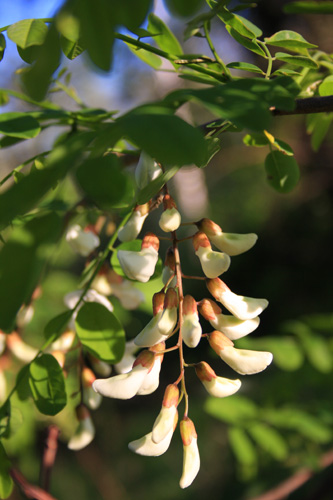
Gentle blossoms of the black locust in May.
(*photo credit)
July 21, 2014 Black Locust: Weed Tree or More?
It was my father's favorite tree (Robinia pseudoacacia), maybe because the locust fence posts would resist rot so well, or because the trees grew so rapidly and fixed nitrogen in our rocky limestone soil. For whatever reason (I never asked), he planted these in our front yard and there they grew to maturity; they were not really good shade trees with their rather thin leaflets, but for one week in early May the black locust would become glorious, giving off their fragrant flower clusters that resembled other members of the legume family. In fact, the landscape of the traditional locust growth range (mainly southern Appalachians and Ozarks) explodes with blooms and their wonderful scent. Bees and hummingbirds pollinate these trees and their pods become food for wildlife.
After May, the black locust clusters in woodland and fence rows slip back into near oblivion. Or do they? Not so, for virtually every mid-July they are the first to lose their leaves through a leafminer blight, and one can tell this month of the year by the locust's brown and dried condition in the woods. In a short while they will become defoliated. And they are susceptible to other diseases, as well as cold weather damage when planted in northern regions. Frankly, the locust tree is not really beautiful, for the branches have small thorns and the bark is gray to light brown and heavily ridged and furrowed like woven rope. Mature trees can reach eighty feet high, but more often younger shoots are short-lived, for they are first in forest succession.
Locusts can propagate from suckers into thickets in all types of soil except swampy areas. We find the black locust among stands of yellow-poplar, white oak and northern red oak. Really locusts are intolerant to shade and only take hold well where openings appear in the forest cover. The black locust is a pioneer tree, usually human influenced and generally short-lived and seldom maturing for saw timber quality; thus the locust is a favorite for shelter belts and land reclamation, either volunteering naturally or planted. Locusts are good for erosion control, for the roots are shallow and wide spreading (soil binding) and still have the ability to become deep rooted and thus resist drought; a few or a cluster may become a minor part of the ultimate canopy layer.
Besides the long lasting fence posts, the taller and more mature black locust trees have been used for mine timbers, poles, railroad ties, ship timber, boxes, crates and novelties. Beekeepers will set hives in clusters of black locusts, for the honey is prized. The black locust is regarded as superior to other hardwoods for developing wildlife habitat on mine spoils, and the shoots are food for the deer. I always regard the black locust as an example of our humble state and they teach us lessons of doing well at times of blossoming, and then recede into the wooded crowd. Such is the calling of the black locust -- and each of us as well.
Prayer: Teach us, Lord, to learn from plants and animals how
to live, and to find valuable lessons from the humble locust.

A hot July stroll along a country lane.
(*photo credit)
July 22, 2014 Nuclear Weapons and Power Questions
The morality of nuclear weapons production, retention, and use has been discussed for decades, but seldom in conjunction with nuclear power generation. Here are some introductory questions:
1. Justification -- Was the peacetime use of the atom conceived in the guilt of the bombing of Nagasaki and Hiroshima? Was nuclear power ill-conceived due to failure to address the waste issues associated with power generation? Does nuclear medicine justify nuclear power generation?
2. Security -- Were the bomb programs continued for internal security purposes and yet leading to basic global insecurity? How have weaponry secrets been kept out of the hands of thieves, terrorists and rogue states? Is the retention of stockpiles of nuclear weapons a manifestation of inherent insecurity? Does this lead to the current confrontation with Iran?
3. Duplicity -- In tolerating nuclear weapons for some and encouraging nuclear power facilities apparently for all, is there double-dealing in our national policy? Isn't the way we treat the total nuclear enterprise duplicitous? Is Israel's nuclear program overlooked while attention is given to Iran? What about the manner bomb-holding North Korea is treated? Does failing to address a nuclear-free Middle East spring from this attitude?
4. Power -- Does the sense of power in producing and possessing nuclear weaponry extend to nuclear energy facilities? Are these forms of god-like dominance? Does this concentration of power erode our democratic values as a people?
5. Complexity -- Is nuclear technology so sophisticated that it defies control by a democratic people, leading to maintenance by a highly experienced elite? Are controls of the weaponry program progressive "militarization" of peacetime uses of the atom?
6. Transparency -- Are there hidden forces at work in the intertwining of military and peacetime use of the atom that erode world peace efforts? Are commercial enterprises inter-connected with military buildup and ventures? What about the right to know where current military nuclear programs are going?
7. Alternatives -- Are the mining, processing, and enrichment of uranium for military "necessities" extended to the nuclear power areas? Does this governmental support distort the level playing field of alternative renewable energy sources?
8. Proliferation -- Is nuclear proliferation inevitable unless we bite the bullet and become totally nuclear-free, both militarily and with respect to nuclear power generation? Are nuclear weapons and nuclear power joined in an unholy alliance?
Prayer: Lord, inspire us to always ask honest questions.

A quiet moment along the Chaplin River, KY.
(*photo credit)
July 23, 2014 A Moment of Grace: We Are the Poor
Identifying with the poor is never easy to achieve, and yet we hear the Lord speak plainly that to remain rich endangers our salvation (easier for a camel to pass through the eye of a needle). We have several degrees of approaching the goal of being poor in spirit, which we must continue to reflect upon on our journey of faith. A socially addicted society includes our sharing this addiction, and realizing our own weakness to bring about change without help. A truly humble person is close to our wounded Earth and realizes limited power to act. However, the realization becomes a moment of social grace wherein by finding others we can strive to speak together in one voice -- and within our admitted impoverishment we discover power -- that of the risen Lord.
The lowest level of impoverishment is the insensitivity of the affluent. Such folks think themselves holders of goods (not gifts) deserved through their own fictitious efforts or privileges to which they are entitled -- and for them "the poor be damned." In fact, the damnation is more heavily directed to the insensitive, and to overlook this with some tepid excuse that the poor caused their own condition is not in accord with Christian tradition. This attitude separates us from God and is only overcome by accepting the grace to look about, to hunt out and see the poor.
The second level is one of compassionate approach when and where we enter into the lives of the poor, not just in attitude but through charity and good will, praying for the poor and volunteering time and effort when and where possible. Here the distance separating de facto differences is narrowed but not eliminated. Most people prefer this level, for it seems better not to have to "smell like the sheep" in Pope Francis' terms.
The third level is one of identity, and in a true sense we are destined to experience it at least at the moment of death. Several ways exist to reach this level in the time that remains for us. One could move into a poorer community of people and give up all goods and be perfect as the Lord directs those seeking perfection. A second way does not involve dramatic physical change, but emptying ourselves of material possessions for the benefit of the poor, seen as our brothers and sisters.
This identity in which we can say "we the poor" is one of poverty of spirit and is certainly not meant to be pretending in any manner. We show gratitude for God's gifts that we do not really deserve; we share them with others for they are merely our temporary stewardship. And we identify with those too powerless to act alone because we are part of an addicted culture. Our social impoverishment hits us with force. We cry to God, the cry of the spiritually poor, while seeking ways to share with other poor folks in our midst.
Prayer: Lord, teach us to accept the condition of being poor and give us the insight to see what we can do about it.

Chipping sparrows, creatures of the air, bathing after summer rain.
(*photo credit)
July 24, 2014 Amelia Earhart and History
When they (women) fail, their failure must be but a challenge to others. - A.E.
The famous pioneer American aviator, Amelia Earhart, was born 116 years ago today in Atchison, Kansas. From earliest times she developed the urge to follow male flying enthusiasts. After high school she served as nurse's aide in Canada during the First World War and then attended college. She perished in a world- circumventing flight in 1937, and the whereabouts of her crash site somewhere in the vast Pacific Ocean has been disputed and written about numerous times. She had already broken some women's flying records including being the first to fly to an altitude of 14,000 feet, the first woman to fly with others across the Atlantic (1928), and the first to solo the Atlantic (1932). As time went on, she sought still more records and wanted to do it as a trail-blazing woman's model for others with adventurous goals.
Nothing seemed to stop her, for Amelia was drawn ever more tightly into flying ventures and by the desire to excel in the many challenging feats. For her anticipated 29,000-mile aviation journey around the world she was accompanied by a navigator, Fred Noonan; the two completed all but the final 7,000 miles across the Pacific. The two left Lae, New Guinea, heading across the vast ocean on the longest hop without landing -- a span of 2,556 miles to Howard Island with hardly anything there but an airstrip. The two emptied out all the non-essentials and added as much fuel as possible (200 plus miles to spare). However, on ascending, the plane ran into foul weather, forcing Amelia to fly low and it cost all the extra fuel supplies; they radioed difficulties and then lost contact. The entire nation was waiting and anxious to know the outcome, and so this disappearance resulted in the largest sea and air search ever undertaken (until the Malaysian missing airliner search this year. The plane's loss devastated a nation.
Amelia's attempted feat when global communication was in its infancy and airplanes were little better, is why we regard her and her act as that of a heroine. She was not trying the impossible, for others would come along under better circumstances and complete her venture successfully. What makes her a heroine is that she attempted so much with so little at such great risk. What Amelia Earhart taught women (and also men) is that we too must attempt the challenging, even at great risk that projects (healing Earth) may not be achieved in our own life time. It's the sower (see July 13) who has the greater task and greater courage -- and Amelia was a sower in primitive aviation. She showed courage and leadership to the many who would come after her, people endowed with instruments that were advanced technologically, along with better communication systems. But in such challenging areas as saving our wounded Earth we need Amelia's courage to bring us to successfully complete the serious work ahead.
Prayer: Lord, give us the courage to heal our troubled Earth.

Quiet walk around Hematite Lake. Golden Pond, KY.
(*photo credit)
July 25, 2014 Pilgrims Take Journeys in Faith
This is the Feast of St. James the Apostle, and we are reminded that pilgrims by the millions from the Middle Ages on into our times have taken the route through Europe to Compostela in Spain. At this location was an ancient Christian cemetery, which tradition held contained the remains of the apostle James. Recall that sacred pilgrimages have their place in our cultural traditions and are worth reflecting upon.
* Pilgrims must be persistent and tenacious. The goal is far up ahead along with a journey of toil and possible risk. Life is not all by air-conditioned luxury fare. It involves road grime and a certain taxing of nerve and physical energy to complete the task intended. Really there is no looking back except to give an orientation as to where we came from with respect to our goal.
* Pilgrims trust in God. All trips have risks attached and these are more than endurance tests of our will power and physical stamina. They are prayerful exercises, in which God enters into the journeys' process. We cannot complete our tasks ahead without the help of the Almighty.
* Pilgrims are resourceful and pay attention to the road, see the sights as they unfold, and yet are preoccupied by thoughts of the destiny ahead. These are directed to goals requiring hope that victory is yet to come, but it takes effort to reach goals.
* Pilgrims are alert to the unexpected. Pilgrimages are no time to be lethargic and carefree, for they involve missions for each participant, and these must be completed in limited time. We remind ourselves to have a prayerful focus and attention, straining on like runners in a race.
* Pilgrims look about for companionship, for the journey is arduous enough and others are also suffering as they move along beside us. Our constant companion is the Lord himself who walks with us. Opening oneself to share with others is also a way of easing the burdens on both oneself and the other. Together, the two or so can ease the loads and add to the quality of the trip.
* Pilgrims are serious and occupy the mind with meaningful and not frivolous activities; it is the time to praise and thank the Lord for the gift of mobility. Dissipation distracts the pilgrim and tempts one to give up. Throughout history, pilgrims sang hymns and gave time to uplifting thoughts.
* Pilgrims learn about their precious time; their journeys seem long but are actually short spans that pass quickly and soon will end. Joy emerges and becomes apparent when the shrine or goal is reached -- a symbol of our respective journeys of faith.
Prayer: Lord, inspire all to make pilgrimages to refresh their
life journey's and to treasure those travels already made.

Black rat snake, Elaphe obsoleta obsoleta, in barn.
(*photo credit)
July 26, 2014 Snakes Deserve Our Respect
Recently here in Kentucky a long-time snake-handling preacher died from a snake bite. What a sorry mishap! We recall that naturalists have a difficult time convincing people that snakes are good and loveable creatures, if not mishandled or irritated in some manner. Maybe it is the connection with Biblically-described evil in the form of a serpent that fashions the general population's abhorrence or fear of snakes. Perhaps it is the ending of St. Mark's Gospel not to fear snakes, that makes the snake-handling phenomenon persist in Kentucky.
Most people know that some native snakes are poisonous and will strike back if cornered or stepped upon -- and may not like being displayed in church services. The general ambivalence about snakes made it difficult when I directed a nature center on the Rockcastle River with its poisonous copperhead snakes in the valley and rattlesnakes in hills above. We cautioned to be on the look out in any natural area. We reminded visitors to watch their footsteps and that snakes do not seek out people, but would rather remove themselves from human presence as much as possible. In fact, most snakes are quite shy and are more alarmed by our presence than we are by theirs. We strived to keep paths cleared for walking and hiking, but never denied that a variety of snakes are present. We never had a snake bite problem during my time there though we saw numerous snakes.
I think much of snake fear is unfounded and actually obscures our seeing snakes as friends willing to control the rodent population. Snakes are quite charming and beautiful and can even be regarded as pets under certain circumstances. Snakes are graceful and agile; they are able to enter and leave from very small apertures; they sleep all winter or at least make themselves scarce; and they only rarely get near where people congregate. Actually, we found that snakes enjoyed sunning themselves in the sun when early autumn mornings were frosty and afternoons were warm. It took tolerance to let them be themselves and not step on them. Letting them live was a real advance in my own attitudes, for in youth we killed poisonous copperhead snakes on sight.
Yes, respect snakes, for we need to appreciate all nature not just cute or fuzzy creatures. Snakes invite us to understand their niche in the great chain of being; snakes can draw our attention with little effort; snakes become our windows to broader nature; they beckon us to encourage all who desire to be closer to nature to overcome cultural fears and feelings of uneasiness about wildlife. Many people definitely fear snakes and spiders and hornets, and it is difficult to change their views on things. Others have a sense of curiosity and want to learn from these creatures. Building on that willingness to learn when introductions are gentle can be a way of overcoming fears based on cultural bias. Snakes help us grow with respect to creatures.
Prayer: Lord, teach us respect for all your creation.
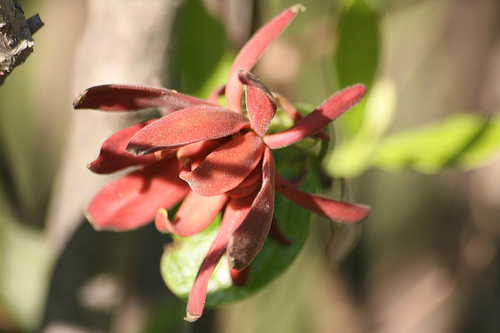
"Bubby bush" - Calycanthus floridus, common Appalachian garden shrub.
(*photo credit)
July 27, 2014 Find and Acquire Treasured Resources
Every scribe who becomes a disciple of the kingdom of heaven is like a householder who brings out from this storeroom things both new and old. (Matthew 13:52)
The parables Jesus is speaking about today tells of a merchant who stretches the limits of his personal resourcefulness to acquire a very precious treasure that he comes to learn about, or a very precious pearl worth focusing all on acquiring. It is not that we are to be materially greedy for such possessions, but that we are to learn from the manner of these merchants how to acquire something valuable -- to use all resources at hand.
Today we discover material resources being acquired and squandered in greedy ways so as to endanger our wounded Earth. Our calling is to become healers of Earth and that means gathering together not just book-learning and experience (always needed), but all the humans who become resources working together in the vast healing process. These become the hidden treasures discovered and requiring links and encouragement as part of the healing team. The needs are immense; the people willing to help need encouragement at this time. The key is our coupling of need with people -- a major problem because this takes ingenuity and our own sense of sincerity and resourcefulness.
We have to present a balanced message and yet it is not an enticing one of comfort and convenience. The message is one of a difficult healing task with no full assurances that the efforts each of us make will mature in our own lifetime. We find a risky task that could be scoffed at, and some will try to persuade us that we are wasting our time. The Lord is calling us to do something that is old -- serving the needs of others -- and something that is new -- healing a wounded Earth through the power of God working within us. We must seek no profit except of spiritual value and thus must seek as pure a motivation that we can muster.
Agents of change are the treasure, not economic things; the right small group at the right time can change the world. Anthropologist Margaret Mead says, Never doubt that a small group of thoughtful, committed citizens can change the world; indeed, it's the only thing that ever has. The resourceful quest is to find these breathing nuggets of change, some of whom see little hope or change at this moment. They are often hopeful enough to wish to do some good, but they lack the added energy it takes to find like-minded folks who will join in the immense task ahead. They are old in their hopes that unite with that of ancestors who wished for the best; they are new to the tasks ahead and need to see the urgency of the moment and to see this within a community of like-minded people.
Prayer: Lord, give us the grace to discover the treasures of other coworkers in the vineyard, and to encourage them to help.
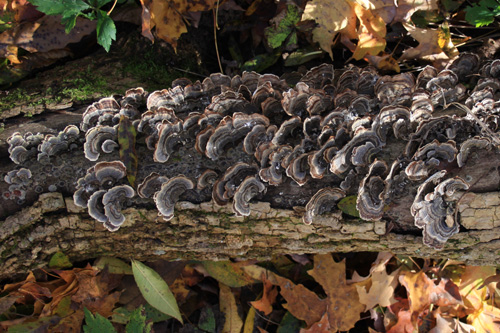
Turkey tail fungus, Trametes versicolor.
(*photo credit)
July 28, 2014 How Do We Handle Impending Catastrophe
Must we do like some and deny or ignore climate change altogether? On the other hand are we to become a Chicken Little and say the sky is falling? Or is there an in-between state that shows concern for future generations knowing full well we aren't going to be around when grandchildren have environmental problems?
Denial is out of the question when 98% of scientists say that climate is affected by anthropogenic factors. Those who deny the coming happenings are either deliberately dishonest or so much in the hire of the profiteers of this land that they are no longer able to make moral judgments by themselves. Prudence, often an overlooked virtue, calls for action.
Chicken Little is based on faulty phenomenon and with little regard as what to do except resort to panic, and run about like chickens with their heads off. Undue fear will cause some to grasp for the status quo because advocates of change are unpredictable, whereas profiteers are programmed to greedy operations.
Vaguely concerned folks are about as dishonest as these first two categories, for they do not portray the seriousness of the situation, allowing the merchants of denial to dredge up opponents of human-generated climate change who quote strange stats to show the world in times past (before humans) got warmer or cooler at times. Lack of concern makes them status-quo retainers as well.
Sober witness to the truth can make a special impact if stated boldly and firmly. The truth makes us free! A deep authentic spirituality looks out for our neighbor in every way and climate will affect many, and especially the poor. Most people do not want to admit the thoroughly secular position that after they die nothing else exists; thus, why should they worry about a future generation when they will not be around to be affected? Secularism has little to say about future provisions for unborn generations, and that is its utter weakness and horrible danger.
An authentic concern for neighbor is not a major concern of the current System, which promotes the almighty self and lets others fend for themselves. Does caring for impoverished future groups mean rebelling against profit-motivated excessive capitalism in which we find ourselves? Once overcoming secularism we come to the spiritual mandate best nourished through religious practice, because communities must act together responsibly and respectfully. We can only heal this wounded Earth by collective action, not individualists with new ideas. If we work together and trust in God's grace we can stop the tragedy before it happens. We need not work from fear, but the love of the poor -- present and future who will suffer from climate change effects.
Prayer: Lord, teach us to tell the plain truth with faith that we can make profound changes needed to heal our wounded Earth.

July 19, 2014 GUNS: Giving Us Negative Security
This month Brassica Books is publishing the newest addition to our "works-in-progress" entitled GUNS. This work tracks the evolution in one person's attachment and detachment from these powerful and dangerous instruments over a lifetime: the way guns have been observed, celebrated, used, discerned, reconsidered, and spoken against over an eight-plus decade lifetime.
This view extends beyond an individual's growth of consciousness to include an entire nation; our people have misinterpreted the national constitution to consider guns as a private preserve, thus allowing vast numbers of individuals of all descriptions to be armed, often with automatic weapons. This cache of three hundred million weapons is essentially uncontrolled and subject to the whims of many people who have no business with guns of any sort. The constitutional "well regulated Militia" that is to be the security of a free State has been infringed upon by greedy individuals bent on a private arms race that intensifies with each mass killing in some part of our fair land. Differences have become so great that America is being held hostage by millions of bullies with guns. Unfortunately, this mentality is a national one with its vast array of military hardware bent on making the planet a safer place -- a materialistic mirage by amateur weapon-holders.
The emerging consensus in areas of great threat is that the insecurity of gunholders is damaging the quality of life of the large majority who do not have weapons. One misplaced and highly influential lobby (NRA), in coordination with weapons producers and traders, attempts to bully the public into the absurd belief that arming more and more is a means to security. However, the opposite is really the case. Guns render youngsters to elders into stressed individuals too afraid to voice their fears. The presence of so many guns in wrong hands destabilizes our communities and weakens the trust we have in our neighbor. More now see that this condition cries for communal discernment and resulting action. As in other civilized nations, gun possession and use must be strictly controlled at the governmental level.
This book is dedicated to countless victims of gun violence in America, and to their survivors who are courageous enough to speak out while living amidst an intimidating national arsenal of unregulated firearms. We also give special mention to law enforcement personnel so often called to be the first responders when tragedy occurs and who are our thin line of defense in a crazy world of assorted gunholders. Please resolve to pressure legislators to enact needed requirements to make our nation a better environment for those of us seeking to live a secure gun-free life. To view and download GUNS; enter <www.brassicabooks.com/guns>.
Prayer: Lord, give us the courage to secure our land through properly regulated gun control.
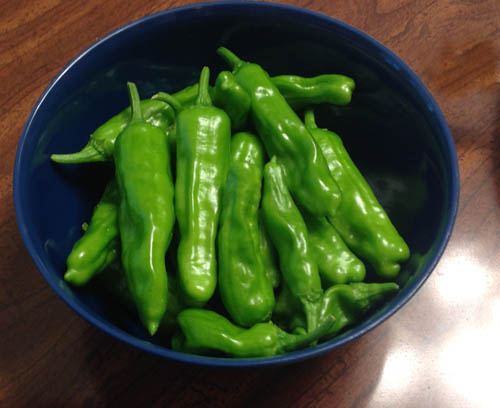
Fresh peperoncini peppers.
(*photo credit)
July 30, 2014 Celebrate God's Gift of Peppers
For some of us, peppers on the vine are a sight to behold. I once grew sweet peppers that actually hung over the sidewalk of one of the busiest streets in Washington, DC but did not lose a single one. Perhaps people didn't realize what they were and thought them decorative. Or was this the forbidden fruit to Adam and Eve? Was it lost by misuse and rediscovered by Columbus and crew who renamed it "pepper," thinking it the source of the East Indian spice (Piper niger)-- that is, the black and white pepper used as a condiment. This misnomer, like "Indian," has remained.
The amazing part of the strange pepper story is that the Western Hemisphere pepper, while quite different in biological classification from the East Indian plant, still was globalized through Spanish and Portuguese influence and became part of Asian cuisine. Our Western "pepper" is in the nightshade family (Solanaceae) and is an authentic contribution of the Hemisphere that includes tobacco, potatoes, tomatoes, eggplant, and petunias. Two of the common sub-areas are the Capsicum annuum that includes our mild bell peppers, paprika, and jalapenos (Chipotle chiles from Mexico) and Capsicum frutescens that includes Cayenne pepper (from the river in French Guiana) and tabasco. The latter is what we know as red pepper, which we also use as a condiment.
In our American gardens we grow a variety of peppers, but the most popular are the mild varieties or sweet peppers including the favorite large bell peppers, which are green when immature and red when ripe; these are crisp and juicy in texture and used in a variety of meat and other dishes. However, American garden peppers cover a wide range of heat and color variations going from yellow to green to red and even to purple. Their heat content figures into our selection and is the measure of the amount of chemical capsaicin present. Pepper heat intensity is measured through Scoville units with the pure chemical at 15,000,000 and the hot habaneros at 300,000, and what mild cuisine eaters would find intolerable at 4,000. Beware! Hot pepper lovers risk heat but know that peppers are not harmful, if one endures that initial heat (caliente). We discover that hot ones can be followed all the way through the digestive track, if you monitor food movement.
There is some controversy over heavy pepper eaters and stomach cancer rates, and yet we all know that peppers within foods can kill harmful microorganisms and that they are generally loaded with Vitamin C, so there are differing opinions on health and harm. The truth is to eat in moderation -- especially peppers. Let's all be our own judges on what is too hot for the taste. Cooking can both moderate and preserve flavor. We then select peppers according to the spicing of favorite dishes, soups, pastas, and sauces. As we prepare for the 2014 pepper season's fruit, let's consider how we select our produce and how we choose to eat them.
Prayer: Lord, allow us to learn from pepper choices how much
we need to moderate our lifestyles and help others do the same.
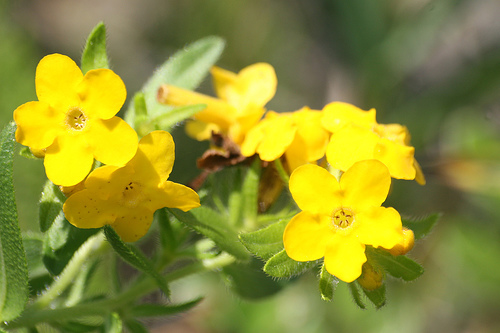
Hoary puccoon, Lithospermum canescens. St. Ignace, MI.
(*photo credit)
July 31, 2014 St. Ignatius and the Environment
This year we are blessed with the 200th anniversary of the restoration of the Society of Jesus, as well as having a Jesuit pope. St. Francis saw all creation as friends; St. Benedict directed attention to hospitality and communal work and prayer; Quakers and Amish champion simplicity, Buddhist meditations, and primitive religions show respect for the fragile world around us. But what about specific Ignatian contributions? We discover his thrust of prayer and Spiritual Exercises -- a strong action plan:
* Ignatian prayer is grounded in the HERE and NOW. In reflecting on the Lord and the divine mysteries, we place ourselves in a setting of time and place; thus, we become more deeply aware of how our environment fashions our stance before God and neighbor -- a time and place sensitive spirituality;
* Ignatian prayer focuses attention on a single person, Jesus Christ, who is also the perfect ecologist. We find in Jesus' life, death, and resurrection a model for healing our wounded Earth; and * Ignatian prayer is open to all God's creation. In his administrative years Ignatius went out at night and gazed to the heavens in contemplation. Let's always praise God.
God's Grandeur
Gerard Manley Hopkins, SJ (1844-89)
The world is charged with the grandeur of God.
It will flame out, like shining from shook foil;
It gathers to a greatness, like the ooze of oil
Crushed. Why do men then now not reck his rod?
Generations have trod, have trod, have trod;
And all is seared with trade; bleared, smeared with toil;
And wears man's smudge and shares man's smell; the soil
Is bare now, nor can foot feel, being shod.
And for all this, nature is never spent;
There lives the dearest freshness deep down things:
And though the last light off the black west went;
Oh, morning, at the brown brink eastward, springs --
Because the Holy Ghost over the bent
World broods with warm breast and with ah! bright wings.
Ignatian degrees of humility can be applied to the environmental actions in which we are involved:
First Degree -- Always use respect and never damage air, water, or land through pollution or waste precious resources;
Second Degree -- In doing repair, be willing to find new ways of improving reclamation and appropriate technology projects;
Third Degree -- We cannot act alone, for our cooperative endeavors must look beyond as poor folks needing trust in God.
Prayer: Lord, help us to imitate those going before us so that their insights and prayers might be fulfilled in our actions. |